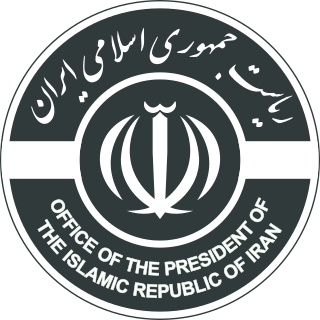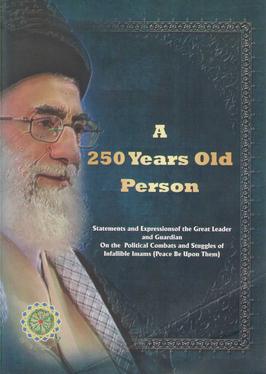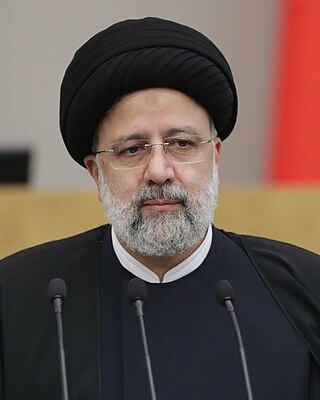See also
- Murderaz-e Rahbar, village in Kohgiluyeh and Boyer-Ahmad Province, Iran
Rahbar is the common name for the Supreme Leader of Iran. It may also refer to:
Rahbar Wahed Khan, Bangladeshi footballer

The politics of Iran takes place in the framework of an Islamic theocracy which was formed following the overthrow of Iran's millennia-long monarchy by the 1979 Iranian Islamic Revolution.

The president of Iran is the head of government of the Islamic Republic of Iran. The president is the second highest-ranking official of Iran after the Supreme Leader.

Ali Hosseini Khamenei is a Twelver Shia marja' and the second and current supreme leader of Iran, in office since 1989. Previously he served as the third president of Iran from 1981 to 1989. Khamenei is the longest serving head of state in the Middle East, as well as the second-longest serving Iranian leader of the last century, after Shah Mohammad Reza Pahlavi.

The Assembly of Experts, also translated as the Assembly of Experts of the Leadership or as the Council of Experts, is the deliberative body empowered to appoint the Supreme Leader of Iran. All directly elected members must first be vetted by the Guardian Council.

Abdollah Noori is an Iranian cleric and reformist politician. Despite his "long history of service to the Islamic Republic," he became the most senior Islamic politician to be sentenced to prison since the Iranian Revolution, when he was sentenced to five years in prison for political and religious dissent in 1999. He has been called the "bête noire" of Islamic conservatives in Iran.
Samuel Rahbar was an Iranian scientist who discovered the linkage between diabetes and HbA1C, a form of hemoglobin used primarily to identify plasma glucose concentration over time.

A constitutional referendum was held in Iran on 28 July 1989, alongside presidential elections. Allegedly approved by 97.6% of voters, it was the first and so far only time the Constitution of the Islamic Republic of Iran has been amended. It made several changes to articles 5, 107, 109, 111, and added article 176. It eliminated the need for the Supreme Leader (rahbar) of the country to be a marja or chosen by popular acclaim, it eliminated the post of prime minister, and it created a Supreme National Security Council.

Farhad Rahbar is an Iranian economist, academic, president and member of board of trustees of the Islamic Azad University, full professor of interdisciplinary economics and the former Chancellor of the University of Tehran.

Sara Rahbar is a contemporary artist. Her work ranges from photography to sculpture to installation, all of which reveal and transform the artist's personal experiences and are intimately autobiographical. Her work explores concepts of nationalism, separation and belonging - driven by central ideas of pain, violence and the complexity of the human condition. Compelled by an instinctual obsession to piece together and dissect, her approach is reflective of her need to deconstruct her emotions and memories.
Rahbar was an Iranian Persian language daily newspaper, published from Tehran. It was the central organ of the communist Tudeh Party of Iran. The decision to launch Rahbar was taken at the First Party Conference held in October 1942, after that Abbas Iskandari, the editor of erstwhile central organ of the party Siasat, had been expelled from the party.

The Supreme Leader of Iran, also referred to as Supreme Leader of the Islamic Revolution, but officially called the Supreme Leadership Authority, is the head of state and the highest political and religious authority of the Islamic Republic of Iran. The armed forces, judiciary, state television, and other key government organisations such as Guardian Council and Expediency Discernment Council are subject to the Supreme Leader. According to the constitution, the Supreme Leader delineates the general policies of the Islamic Republic, supervising the legislature, the judiciary, and the executive branches. The current lifetime officeholder, Ali Khamenei, has issued decrees and made the final decisions on the economy, the environment, foreign policy, education, national planning, and other aspects of governance in Iran. Khamenei also makes the final decisions on the amount of transparency in elections, and has dismissed and reinstated presidential cabinet appointees. The Supreme Leader is legally considered "inviolable", with Iranians being routinely punished for questioning or insulting him.
Murderaz-e Rahbar is a village in Sarrud-e Jonubi Rural District, in the Central District of Boyer-Ahmad County, Kohgiluyeh and Boyer-Ahmad Province, Iran. At the 2006 census, its population was 390, in 72 families.
Jamejam is an Iranian newspaper in Fars Province. The Concessionaire of this newspaper was Rahbar ShiraziAlireza Roostayian and it was published in Shiraz since 1915.

A 250 Years Old Person is a book by Ali Khamenei, Supreme Leader of the Islamic Republic of Iran. It is a collection of his lectures on the political combats and struggles of Shia Imams. This book consists of 17 chapters.

Sayyid Ebrahim Raisolsadati, commonly known as Ebrahim Raisi, is an Iranian principlist politician, Muslim jurist, and the eighth and current president of Iran since 3 August 2021, having been elected to the presidency in the 2021 election.

Fatemeh Rahbar was an Iranian conservative politician who served three terms as a member of the Iranian Parliament representing Tehran, Rey, Shemiranat, and Eslamshahr. Rahbar was elected to serve in the Parliament for a fourth time, but died before the start of her term.

The Khamenei family or Khamenei dynasty is among the Iranian Azeri Sayyid families who claim to be descendants of the fourth Imam of Shia Islam, Ali ibn Husayn Zayn al-Abidin — according to the "Khamenei family tree". Their dwelling place(s) were/are in Azerbaijan (Iran), Najaf, Tafresh, etc.
Events in the year 2020 in Iran.

The supreme leader of Afghanistan, officially the supreme leader of the Islamic Emirate of Afghanistan and also styled by his religious title Amir al-Mu'minin, is the ruler, head of state, and highest religious authority of Afghanistan, as well as the leader of the Taliban. He has unlimited authority, though in practice he shares some power with the consultative Leadership Council, whose members he appoints. He also serves as the chairman of the Leadership Council and is the supreme commander of the Afghan Armed Forces.

Thetelephone call between Hassan Rouhani and Barack Obama took place on September 27, 2013 during Hassan Rouhani's first visit to New York, at John F. Kennedy International Airport in New York City. This historic 15-minute telephone conversation was the first communication between the two countries since ties were severed in 1979.